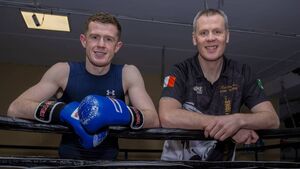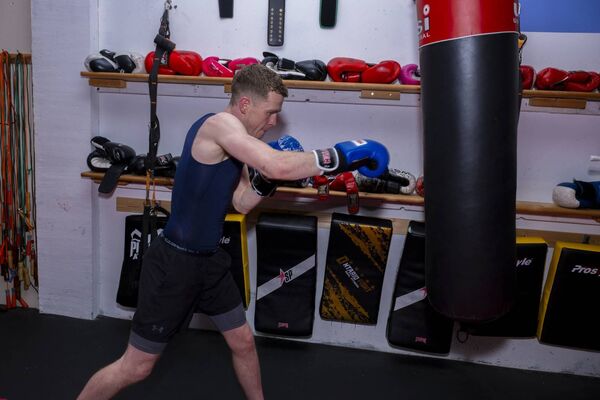Claremorris kickboxer heads for World Championships

Gary McDonnell, left, with coach Phelim Halligan in Claremorris last week in advance of his trip to the World Championships in Abu Dhabi. Picture: John Corless
Gary McDonnell, a member of Claremorris Ultimate Kickboxing Club, will fly to Abu Dhabi this Friday to represent Ireland at the WACO World Championships, the top level of international kickboxing. Gary explained that WACO is considered “the best organisation of all of kickboxing” and that it is already under the IOC. It had been expected to make its Olympics debut in Los Angeles in 2028 but that vote failed; he said the sport is now aiming for Brisbane 2032. Gary admitted that Los Angeles would have been his last realistic chance to compete at the Olympics, as he is now 33, but he remains committed to chasing every opportunity the sport still offers him.
“The world championships run for a full week,” Gary told the this week. “There’s 22 people in my section and each person is a champion of their country, because only one fighter per weight class is allowed to represent each nation.”
Gary has moved up to 63.5kg after a serious car accident last spring that forced him out of training for four months. His back injury remains troublesome. “It is an impediment,” he admitted, but added that at his age he must either go now or not go at all.
Gary is from Ballygar in County Galway, close to the Roscommon border but firmly on the Galway side, he insisted. He originally trained in Galway in kickboxing and boxing but the gym closed during Covid due to low numbers and financial strain. Phelim Halligan, the head coach of the Claremorris club, reached out to him afterwards, offering him a place to train and Gary began working with Phelim in 2021. Since then, his career has accelerated rapidly.
In 2022, Gary became the first Irish athlete ever to win the WACO European Championship in ring sport. In 2024, he went further, becoming the first Irish person to win the WACO Pro World Title. That fight, held in Dublin, lasted twelve two-minute rounds. “I dropped my opponent in the seventh round and actually broke my hand from the punch,” he recalls, having to complete the final five rounds with effectively one hand. He won on points over the Norwegian fighter.
Selection for Abu Dhabi came through the national body. Athletes submit their names and if they are challenged for the position, they must fight for it. No one challenged Gary, so he was selected. He noted that the cut-off age for ring competition is 39, giving him only a few years of eligibility left.
Gary’s commitment stems from a difficult childhood. “I was very shy and I was very badly bullied,” he said. His parents put him into kickboxing and boxing at fourteen to build his confidence. He “absolutely hated it” at first and had to be persuaded to continue but after a month “something clicked” and it became his lifelong passion. Since then he has travelled to nineteen countries for competitions. Between 2021 and now, he estimates he has spent around €20,000 of his own money.
His lifestyle is built entirely around performance. Gary has never drank alcohol, avoids takeaways, watches his diet closely and trains constantly. When he is not kickboxing he is running 5k road races or taking part in Hyrox events (an indoor fitness competition that combines eight kilometres of running and eight functional workout stations, alternating between running and functional exercises). He lives on high-protein food — “a lot of meat, eggs, porridge, fruit and sweet potato” — and takes recovery seriously through ice baths, saunas, solid sleep and routine. His work is in cyber security for an American company, and most of his annual leave is spent travelling to competitions. He said that he “never really gets a holiday” but his employer accommodates him once he gives sufficient notice. He hopes eventually to pursue long-distance running after retiring from kickboxing, though he admitted that he hates the thoughts of retirement.
Gary’s girlfriend is supportive of his sporting commitments, although the schedule can be demanding. He avoids nightlife entirely. “You won’t see me outside the chipper at two in the morning,” he said and added that his choices are deliberate. He wants younger athletes to see that “you don’t need to gamble, you don’t need drugs, you don’t need alcohol,” and that discipline applies to all areas of life.
Phelim Halligan, Gary’s coach in Claremorris, provided a detailed account of the club’s development and the demands of the sport. He said the club began in 2010 with four members and grew slowly to the sixty members the club now has. Phelim said he originally took up kickboxing “to get more fights” to sharpen his boxing, but eventually he became a kickboxer, as the sport took over.
The club’s membership caters for men and women from age eight upwards. Around 20 to 30% are women, though Phelim explained that many of them train for fitness rather than competitive fighting.

A number of members emigrated to Australia last year for work, reducing competitive numbers temporarily. Phelim contrasted injuries in kickboxing with other sports, insisting that above-the-waist kickboxing is often safer than boxing. He said boxing is more “toe-to-toe” with constant head shots, whereas in kickboxing much of the contact is to the body because head kicks are harder to land. He acknowledged that the sport is physical but pointed out that a referee stands within a foot of the fighters at all times, with coaches positioned close enough to intervene immediately.
Phelim himself has several world and Irish titles and said that Gary’s achievements place him at the top tier of the sport internationally. He emphasised that WACO — “the cream of the crop” — is especially demanding. He recalled that the WACO Pro rules required twelve two-minute rounds with eight-ounce gloves, which offer significantly less protection. He considered the eight-ounce rule unsafe, saying it contributed to injuries, including Gary’s fractured hand and cuts sustained by both of them in their own respective fights.
One of the greatest challenges, Phelim stressed, is financial. For elite competitors like Gary, the cost can run to “six or seven thousand a year,” covering travel, accommodation, medicals and entry fees. While Sport Ireland recognises WACO achievements, Phelim said that “that’s as far as it goes.” The gym itself survives through €5-a-night pay-as-you-go sessions. He said the club would not be in existence without support from former local representative Tom Connolly, who provided discretionary funding over four years to purchase mats, bags, the canvas and other essential equipment.
Gary McDonnell praised Phelim’s coaching style, especially his attention to detail. He described how Phelim once brought a small stool into the ring so Gary could practise breathing during the one-minute breaks between rounds. “Most coaches wouldn’t even think of that,” Gary said. “He thinks of all the little finer details.”
Gary flies out this week with the hope that his body holds together for the full championship schedule. He said his aim is simple: to perform to his best ability and “do Phelim and all the lads proud.”




